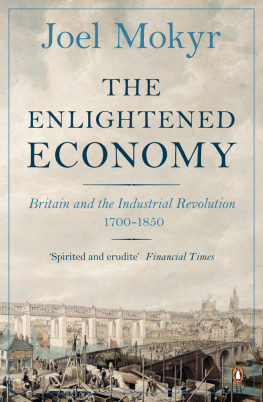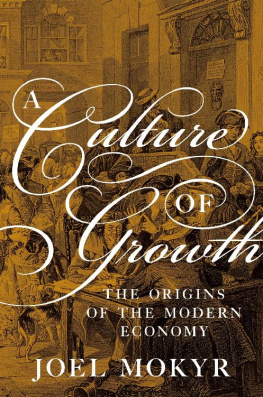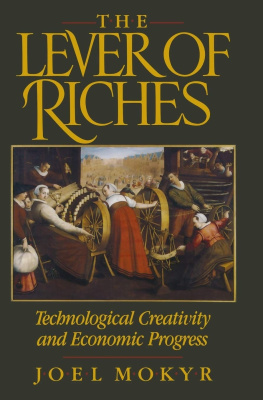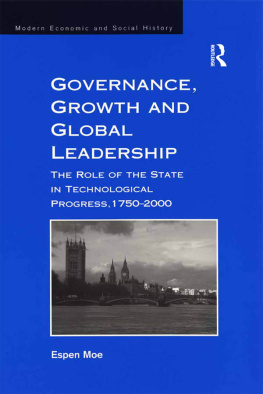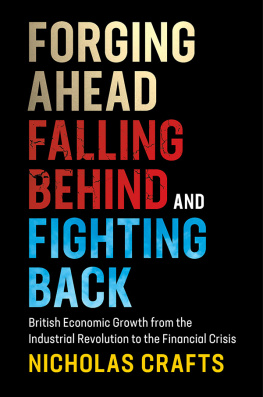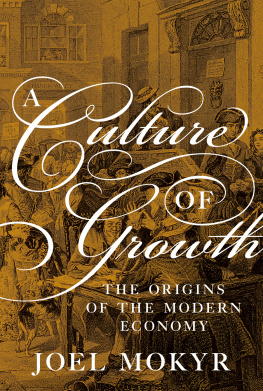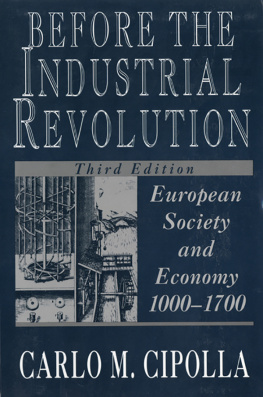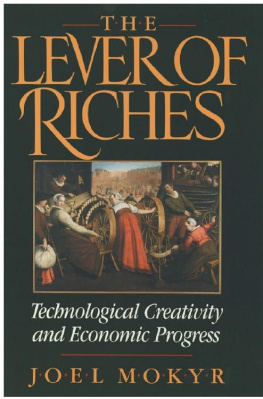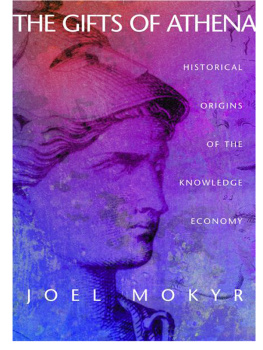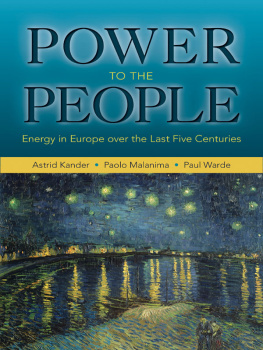JOEL MOKYR
The Enlightened Economy
Britain and the Industrial Revolution 17001850

PENGUIN BOOKS
PENGUIN BOOKS
Published by the Penguin Group
Penguin Books Ltd, 80 Strand, London WC2R 0RL , England
Penguin Group (USA) Inc., 375 Hudson Street, New York, New York 10014, USA
Penguin Group (Canada), 90 Eglinton Avenue East, Suite 700, Toronto, Ontario, Canada M4P 2Y3
(a division of Pearson Penguin Canada Inc.)
Penguin Ireland, 25 St Stephens Green, Dublin 2, Ireland (a division of Penguin Books Ltd)
Penguin Group (Australia), 250 Camberwell Road, Camberwell, Victoria 3124, Australia (a division of Pearson Australia Group Pty Ltd)
Penguin Books India Pvt Ltd, 11 Community Centre, Panchsheel Park, New Delhi 110 017, India
Penguin Group (NZ), 67 Apollo Drive, Rosedale, Auckland 0632, New Zealand
(a division of Pearson New Zealand Ltd)
Penguin Books (South Africa) (Pty) Ltd, 24 Sturdee Avenue, Rosebank, Johannesburg 2196, South Africa
Penguin Books Ltd, Registered Offices: 80 Strand, London WC2R 0RL , England
www.penguin.com
First published in the United States and Great Britain by Yale University Press 2009
Published by Penguin Books 2011
Copyright Joel Mokyr, 2009
All rights reserved
Except in the United States of America, this book is sold subject to the condition that it shall not, by way of trade or otherwise, be lent, re-sold, hired out, or otherwise circulated without the publishers prior consent in any form of binding or cover other than that in which it is published and without a similar condition including this condition being imposed on the subsequent purchaser
ISBN: 978-0-14-196910-7
The same age, which produces great philosophers and politicians, renowned generals and poets, usually abounds with skilful weavers and ship carpenters. We cannot reasonably expect, that a piece of woollen cloth will be wrought to perfection in a nation, which is ignorant of astronomy, or where ethics are neglected.
David Hume, Of Refinements in the Arts, 1752
Acknowledgments
Books such as this are not written alone, even if only one name appears on the title page. During the six years of its writing, I have drawn on the minds and erudition of more scholars than I will ever be able to recall.
A number of names, however, stand out. Among my many dear friends in economic history, none has had a bigger impact on my thinking and research for this book than my life-long vriendin, Deirdre N. McCloskey, who read the manuscript in an earlier version, and gave me a generous dose of her original and unconventional economics, together with the optimal amount of tough love. I have equally learned an enormous amount from Margaret C. Jacob, a brilliant social historian of science and technology. My former student and now friend, colleague, and rabbi, Avner Greif, has left a large mark on the development of my thinking and research as an economic historian. Among the many other people whom I count both as personal friends and as kind but relentless critics of this project, I must mention Robert C. Allen, Maxine Berg, Maristella Botticini, Gregory Clark, Nicholas Crafts, Jack Goldstone, Murat Iyigun, Douglass North, John Nye, Amira Ofer, Cormac Grda, Nathan Rosenberg, Joachim Voth, and Jan Luiten van Zanden. All of them have provided me with valuable suggestions and advice over the years as well as the emotional support that is indispensable over long projects. They have been with me for the duration of the journey, and no one can imagine better fellow-travelers. Gillian Hutchinson, a life-long friend, provided important advice at the final stages of the editorial process. Many others have read half-baked chapters from this book and/or made valuable suggestions, among them Ken Alder, Alice Amsden, Joerg Baten, Dan Bogart, Stan Engerman, the late S.R. (Larry) Epstein, Karla Hoff, Jeff Horn, Tim Leunig, John Lyons, Sarah Maza, David Mitch, Ed Muir, Alessandro Nuvolari, Maarten Prak, Christina Romer, Johan Schot, the late Kenneth Sokoloff, and Larry Stewart.
At Northwestern, many of my friends and colleagues in both my home departments have enriched me with advice, comments, and suggestions. Among them, of course, are the permanent members of the economic history seminar Louis Cain, Joe Ferrie, Regina Grafe, David Haddock, Lynne Kiesling, Hilarie Lieb, and Chiaki Moriguchi. It is a special delight to mention the many graduate students who went through either the economics or the history department at Northwestern and consequently have had to listen to incoherent and preliminary versions of this work and improved it with their many suggestions. I have benefited to no end from their minds and research. Among them, I must single out Ran Abramitzky, Fabio Braggion, Joyce Burnette, Mauricio Drelichman, Haggay Etkes, Kripa Freitas, Tom Geraghty, Elise Lipkowitz, Jason Long, Ralf Meisenzahl, Lyndon Moore, John Parman, and Tuan-Hwee Sng. Gergely (Gergo) Baics read the entire manuscript and hugely improved it with many insightful and wise suggestions. Alexandru Rus appeared on the scene late in the writing, but made many helpful last-minute suggestions. Last but certainly not least, I owe a huge debt to the endlessly resourceful and energetic Marianne Hinds Wanamaker, who has set new global standards for graduate research assistance.
No work like this could ever hope to be completed without undergraduate research assistance. Many talented and eager young women and men have suffered from the afflictions of Enlightenment research, and I am grateful to them all: Elizabeth Brown-Inz, Chip Dickerson, Paul Isaac, Hillary King, Aslam Rawoof, and Margaret Schumacher. A special debt is owed to Michael Silver, whose prodigious editorial talents and capabilities made me regret all the more that he chose to become a lawyer.
Special thanks to the Mercatus Center at George Mason University for organizing a special conference discussing the draft of this ms. in June 2008 in Arlington, Va. Every one of the scholars who attended this conference contributed materially to making this a better book. Those not already mentioned who attended the conference were my admired former teacher, Peter Temin; a friend and fellow Chicagoan for many years, Daniel Headrick; as well as Peter Boettke, Philip Hoffman, Claire Morgan, and John Wallis.
For a decade and a half I have been associated with the various programs in economics sponsored by the Canadian Institute for Advanced Research. The many conversations I have had there with some of the best economists on the planet, among them Daron Acemoglu, George Akerlof, Tim Besley, Elhanan Helpman, Roger Myerson, and James Robinson, have influenced my thinking more than I dare to admit.
Financial support from Northwestern University and the Searle Foundation is gratefully acknowledged. The original idea of writing this book was proposed to me by Simon Winder of Penguin books, and while what was produced does not quite match what he suggested that fateful day, I hope he is satisfied after all. Beth Humphries and Rosamund Howe edited the manuscript thoroughly and with great competence. Robert Baldock and Candida Brazil at Yale University Press in London were voices of sanity and reason in the later stages of the book.
As I have for the past seventeen years, I carry with me fond memories and the intellectual imprint of my unforgettable late colleague Jonathan R.T. Hughes. I suspect he would have liked this book, but I will never know for sure.
Finally, those who can read the dedication and those who cannot all know to whom I owe the biggest debt of all.
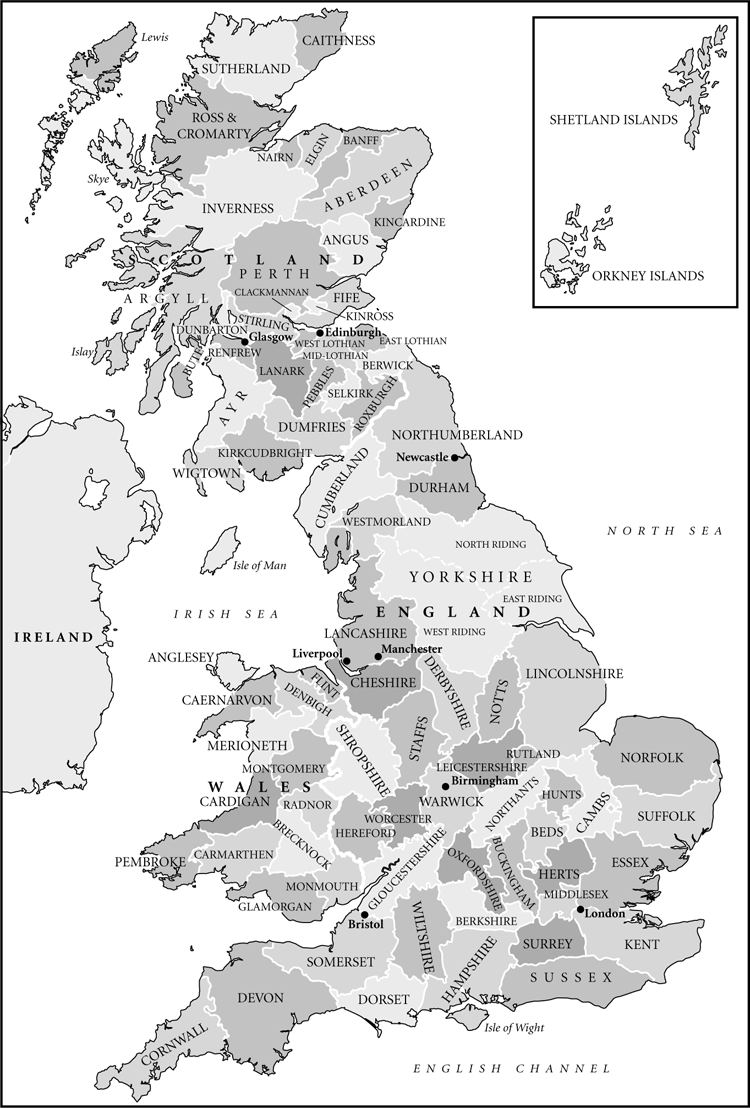
Next page
